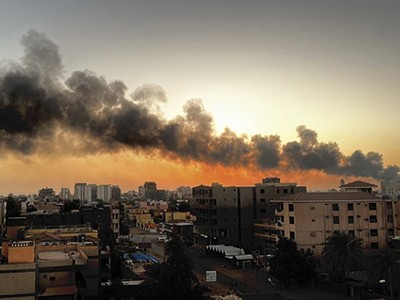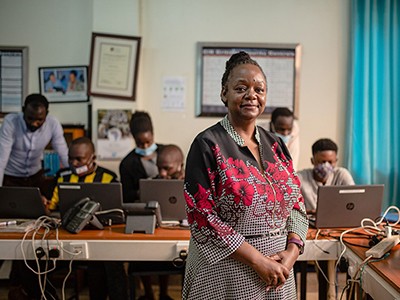One April morning, medical student Asjad Yousif Abdalrahman Bushra awoke to the sound of bombs exploding in Khartoum. He was planning to attend a funeral that day and then start preparations for celebrating Eid. But war had erupted between the Sudanese army and a paramilitary force called the Rapid Support Forces.
As of 22 September, the war had forced more than one million people to flee Sudan; at least 4.3 million have been displaced within the nation, according to the United Nations. Prominent scientists, young researchers and students are among them. More than 100 universities have been destroyed, looted or extensively damaged. The devastation threatens museums and heritage sites, including the University of Khartoum’s main campus, an architectural masterpiece that included a laboratory established by pharmaceutical magnate Henry Wellcome at the start of the twentieth century.
Those who remain in the war zone are unable to continue their research and education because most universities and scientific institutions have closed, especially in Khartoum.
‘Armed groups entered the lab’: Sudan’s researchers flee violent military conflict
Displaced Sudanese researchers and students urgently need support from the global scientific community.
The Sudanese National Academy of Sciences, of which I am president, appealed for help in September (see go.nature.com/3qhwceh). I would urge academies of science, universities and funding agencies to take note and do what they can to host displaced researchers and students.
Bushra’s experience has been emblematic. A battle in front of his house rattled the doors and windows. Family members encountered armed soldiers on the street. His parents would ask him to study to take his mind off what was happening, but he found it hard to focus, and the University of Khartoum had shut down.
Bushra and 31 other medical students escaped to Atbara, a city 300 kilometres northeast of Khartoum. They did so thanks to a concerted effort coordinated by a professor at the university, Elrasheid Ahmed Abdalla, and three Sudanese doctors in Dubai, Riad Bayoumi, Amar Khamis and Omer Rufaei. Abdalla coordinates the programme from Atbara hospital, where he arrived in early May along with the first of the students.
The three expatriate doctors raised money to buy essentials, such as bedding, fridges and cooking utensils, for the displaced students. The Student Support Centre in Atbara provided free group lodgings for them. The administrations of the hospitals in Atbara and Ad-Dāmar shared their lecture rooms and wards for teaching purposes.
Similar efforts are needed to temporarily relocate researchers to other universities that are far from the war zones, either in or outside Sudan. Those who have already been forced to leave their homes should be provided with fellowships to continue their research and studies elsewhere. Host universities need adequate resources and infrastructure, including a reliable Internet connection, so that researchers can connect with their peers, access journals and attend conferences.
These partnerships can benefit host institutions, too. Abdalla has been organizing lectures and medical rounds for almost five months now, and the programme has helped final-year Wadi Neel medical students prepare for their exams. Lectures are recorded so that students in other regions of Sudan or abroad can access them.
Engineering a brighter future for refugees and female scientists in Uganda
It is essential that fellowships and programmes abroad are intentionally short-term, lasting perhaps one or two years and providing opportunities for scholars to stay connected with their home country so that they can help to rebuild Sudan’s academic institutions once stability is restored.
Rebuilding will require major international aid, and not just because of the immediate effects of the war. The University of Khartoum was ranked among the top ten universities in Africa during the late 1970s and 1980s, but the Sudanese higher-education system has witnessed a marked decline in quality over recent decades, in part because of persistent political instability, resource shortages and inadequate infrastructure. But it could become great again.
Twinning arrangements between Sudanese and international institutions will be crucial to re-establish quality education and research. For example, Yangzhou University in China has hosted nearly 1,000 Sudanese students since it paired with the University of Khartoum in 2010. Exchange programmes, collaborations, joint conferences and workshops could also enrich these twinning arrangements.
Through collaborations and targeted fellowship programmes, the international scientific community can support and empower talented Sudanese researchers who have been displaced, ensuring that their contributions can continue to benefit society. The academy is compiling an index of Sudanese scholars to share with the Science in Exile initiative, which provides a list of resources for supporting at-risk, displaced and refugee scientists.
Bushra, for one, was reluctant to leave his home, but he knew his family valued his education and what he could accomplish with it. “I couldn’t fathom how I was going to leave my family in a war zone and go somewhere relatively safe,” he says. “It still feels selfish, but I tell myself that all of this is for them.”


 ‘Armed groups entered the lab’: Sudan’s researchers flee violent military conflict
‘Armed groups entered the lab’: Sudan’s researchers flee violent military conflict
 Engineering a brighter future for refugees and female scientists in Uganda
Engineering a brighter future for refugees and female scientists in Uganda
 How African scientists can give back to their home continent
How African scientists can give back to their home continent








